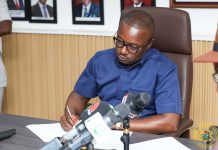In a powerful call for systemic transformation, Daniel Asomani, Founder of VODEC Africa, proposed a radical overhaul of Ghana’s higher education system — urging universities to give students the option of replacing traditional thesis writing with entrepreneurial product development.
Speaking at the National Economic Leadership Forum in Accra, held in honour of Ghana’s first President, Dr. Kwame Nkrumah’s birthday, Mr. Asomani outlined a bold vision: Empowering students to build real-world solutions from ideation to launch.
He believes this shift could significantly increase graduate-led startups by 15% by 2027, if scaled across ten universities.
“These are not just statistics,” Mr. Daniel Asomani declared. “They are blueprints for transformation, roadmaps to prosperity and pathways to the Africa of our dreams.”
Under the forum’s theme: “#Is There Enough Youth Empowerment? – The Pathway to Sustainable Economic Development”, Mr. Asomani unveiled seven transformational ideas aimed at reshaping Ghana’s socio-economic landscape:
- Position Ghana as a West African manufacturing and digital hub under AfCFTA.
- Develop fintech regulatory sandboxes and partnerships to make Ghana Africa’s fintech capital.
- Add value to natural resources – refine gold locally, manufacture aluminum products domestically.
- Invest in human capital, prioritising education, skills and productivity.
- Expand affordable housing as a national development priority.
- Accelerate STEM education – Ghana lags with only 20% tertiary STEM enrollment.
- Support women entrepreneurs – 40% of VODEC’s Idea Challenge funding now goes to female-led initiatives, particularly in industries like shea butter processing, impacting over 600,000 women.
“We must stop being hewers of wood and drawers of water,” Daniel Asomani said. “We must transform from raw resource exporters to manufacturers of premium ‘Made in Ghana’ goods.”
Daniel Asomani stressed that transformation cannot rely solely on private initiatives – systemic change is required, especially in education and youth engagement.
“Transformation requires urgency. While China and India graduate millions in STEM annually, Ghana must catch up or risk falling behind in the knowledge economy,” he adds.
Also, addressing the forum, Dr. Frank Amoakohene, Ashanti Regional Minister, offered a deeply personal account of his own leadership journey, from school years to national politics — emphasising the importance of early youth engagement in governance.
“Youth empowerment is young people having the tools and power to shape their own future,” he said.
“It helps us understand the process of nation-building and teaches us to solve problems rather than run from them.”
Dr. Amoakohene urged the amendment of national laws to include affirmative action policies favoring youth, not just gender.
He added that gaps in existing frameworks, noting that while structures like NYA and NEIP support youth entrepreneurship, little exists to guarantee youth participation in leadership and policy-making.
“We must create legal pathways for youth representation in governance,” he asserted, proposing that young people be encouraged to lead from basic education levels all the way to cabinet positions.
Mr. Asomani concluded his statement with a reminder: “The Africa we dream of will not be built by chance — but by bold reforms, strategic investment, and empowered young people unafraid to lead.”
Chaired by Nana Barima Acheamping Sarpong II, Chief of Sekyere Asaman, the forum brought together stakeholders from academia, civil society, the political class and industry to discuss actionable strategies for youth development in Ghana.
Attendees were encouraged to support one another, form networks of emerging leaders, and commit to ongoing mentorship.










